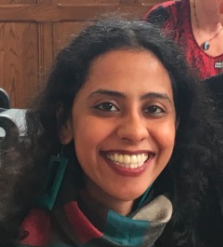
Faculty Associate
sumar[at]yorku.ca
Associate Professor
Department of Politics, York University
Research Keywords:
Muslim societies; so-called Islamic World; forced migration studies; gender and transnational women’s studies; critical race studies; postcolonial theory; decolonial frameworks; subaltern studies; diaspora studies; critical caste studies
Research Region(s):
India, Pakistan, South Asia
Research Diaspora(s):
South Asian Diaspora
Sanober Umar is Assistant Professor in the Department of Politics at York University. Dr Umar is interested in exploring histories and politics of “racing” and gendering Islam as a religion, and how it informs the figure of the Muslim in world politics. She completed her PhD as an Ontario Trillium scholar at Queen’s University in the Department of History and holds an MSc in Migration Studies from the University of Oxford and an MA in International Politics and History from the Graduate Institute of International Studies and Development (Geneva, Switzerland).
In addition to academia, Umar has worked with transnational organizations such as the International Organization of Migration (UN), World Vision, and the Centre for Migration Policy and Society at Oxford University. Umar brings to YCAR her interdisciplinary background, diverse research interests informed by her education and work experience in three continents, and linguistic skills: she reads and writes proficiently in Hindi and Urdu—an asset that has served her scholarship on South Asia and Muslim identity formation.
Dr Umar is excited to continue exploring topics that sit at the intersections of the so-called Islamic World, Muslim societies, forced migration studies, gender and transnational women’s studies, critical race studies, postcolonial theory, decolonial frameworks, subaltern studies, diaspora studies, and critical caste studies.
Dr Umar is also Principal Investigator for a SSHRC IDG-funded project that explores the histories, politics and theories behind the idea of the diasporic/exiled "public intellectual,"particularly in the age of rising social media disinformation, far right global populism, and the changing political landscape of 'multicultural Canada.
